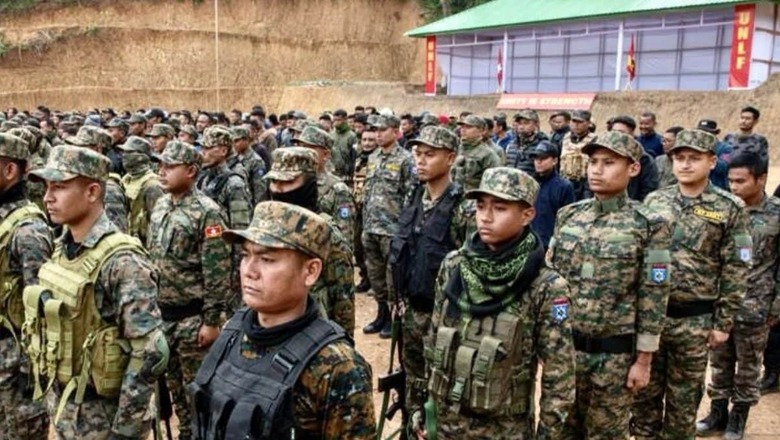
views
The peace deal signed between the Centre and the United National Liberation Front (UNLF), an armed, predominantly Meitei, Manipur-based insurgent group, promises new hope for the strife torn state. The UNLF has agreed to lay down arms and end a six-decade-long armed movement.
The UNLF is the oldest and the largest insurgent group to surrender before the government of India and according to people in the know, may usher lasting peace.
For Union Home Minister Amit Shah, it is a “historic milestone" in his years-long bid to end violence in the Northeast. Shah says the agreement is the result of Modi government’s “relentless efforts to establish permanent peace."
In light of the months-long ethnic violence in Manipur involving valley-based Meitei groups and hills-based Kuki-Zo groups, this peace agreement is a major breakthrough in reining in armed groups and will encourage other groups to join in on the peace process.
The UNLF is now expected to enter mainstream politics in the state, ending decades of guerrilla warfare against Indian forces. While the details of the agreement are not known yet, more than 500 members of the group have laid down their arms announcing a ceasefire.
A historic milestone achieved!!!Modi govt’s relentless efforts to establish permanent peace in the Northeast have added a new chapter of fulfilment as the United National Liberation Front (UNLF) signed a peace agreement, today in New Delhi.
UNLF, the oldest valley-based armed… pic.twitter.com/AiAHCRIavy
— Amit Shah (@AmitShah) November 29, 2023
Who Are The UNLF?
Formed on November 24, 1964, the UNLF, led by Arembam Samarendra Singh, primarily sought secession from India, opposing the merger of the pre-independence kingdom of Manipur with India. It is the oldest valley-based insurgent group, distinct from those in the Naga and Kuki-Zomi dominated hills.
The UNLF reportedly received its early training from the NSCN (IM), the largest Naga insurgent group. In 1990, its armed wing, the Manipur People’s Army, was established. Over the years, this armed faction has executed numerous attacks, specifically targeting Indian security personnel.
The group is known to have been trained by NSCN (IM), a Naga Insurgent Group. It is involved in extortion and illegal arms trading and has operational camps in Myanmar and Bangladesh.
Impact of UNLF Surrender
While around 25 hill-based insurgent groups are in a tripartite suspension of operations (SoO) deal with the Indian government and that of Manipur, UNLF is the first major valley-based group to do so, allowing the formerly banned Meitei-dominated group to conduct its political activities within the ambit of legality.
Under the SoO arrangement, several Kuki and Zomi groups have been operating in designated camps, carrying out political activity while receiving monthly stipends and even ration from the government. Under the garb of the SoO agreement, they have escaped scrutiny over alleged extortion activities and other illegal activities. For this reason, Kuki-Zo groups have had a political advantage over banned valley-based groups.
Two of these groups, the Zomi Revolutionary Army (ZRA) and the Kuki National Army (KRA) are under investigation by the National Investigation Agency (NIA) for influencing agitation among hill-dwellers and causing the months-long civil unrest in Manipur which has caused more than 180 deaths in the state.
It remains to be seen how the ceasefire agreement with UNLF translates into the political landscape of Manipur, as the group is expected to morph into an impactful Meitei pressure group and will possibly open up to engaging with the Indian security establishment to aid it in its counter-insurgency measures.
This may also have a bearing on heightened illegal immigration taking place at the international border with Myanmar and aided primarily by Kuki-Zo groups.
How Modi Govt Has Helped Foster Northeast Peace
The northeast is riddled with insurgent groups and pressure groups which continue to be a major security challenge for India. Amit Shah has spearheaded what has been called “whole of government approach", a strategy aimed at fostering peace while at the same time bringing in development across the region. In October this year, Amit Shah had announced a significant 65% decline in terrorism, left wing extremism, and insurgency incidents.
In the last decade, the Modi government has achieved tremendous success in reining in insurgent groups and there has been a significant decline in areas disturbed by insurgent violence. Amit Shah’s hands-on approach in negotiating peace deals with insurgent groups, including the UNLF, has been a cornerstone of this success.
In 2020, the five-decade old Bodo insurgency in Assam was put to rest with the Bodo Accord which led to the surrender of 1615 cadres. In 2021, the Karbi Angling agreement was signed ushering peace in the Karbi regions of Assam. Around 1000 cadres renounced violence under this agreement. The National Liberation Front of Tripura (NLFT) surrendered after negotiations with the government in 2019.
As a result, the Armed Forces Special Powers Act (AFSPA) of 1958 has been withdrawn from several parts of the Northeast— and from several districts in Nagaland and Manipur, almost entirely from Assam, and completely from Meghalaya and Tripura.
While the recent tribal unrest in Manipur is a hiccup and has roots in heightened militancy and drug trade across the border in Myanmar and Bangladesh, the security situation overall has improved considerably in the northeast with the number of insurgency incidents declining significantly.
Even as ethnic violence struck Manipur in May, Home Minister Shah had visited the state meeting members of Meitei and Kuki communities to conduct peace talks. He even visited Churachandpur, the epicentre of the violence as he sought a solution to the tensions.
The root of the problem in the Northeast has been a lack of development and political isolation. Since 2014, Centre has prioritised connectivity and delivered on several infra projects, from highways to bridges and border roads, at a record pace. This has ushered a wave of development, entrepreneurship and business investment into the region.
Under Amit Shah, the Home Ministry’s “whole of government" strategy has been quite effective and profoundly positive. Development in the region has caught speed since 2014, with major emphasis being placed on connectivity which has served a substantial boost for the region’s tourism industry.
The northeast has witnessed unprecedentedly rapid construction of highways, bridges and roads connecting the remotest areas. This improved connectivity has not only allowed for seamless travel and trade activities which were formerly afflicted with poor connectivity and dilapidated roads, but also bolstered the security status of the region.
Seven new airports have come up since 2014, taking the number of airports in the Northeast to 16. The Donyi Polo airport, the first Greenfield airport in Arunachal Pradesh was inaugurated by Prime Minister Narendra Modi at Hollangi.
The northeast has benefited greatly from the government’s UDAN scheme. For the first time in 75 years, flights have connected five capitals in the northeastern states. The number of flight movements has surged from 852 per week in 2014 to 1,817 per week in 2022, marking an impressive overall increase of approximately 113 percent.
At the same time, BJP has made inroads into the political landscape of the Northeast by allying with regional parties in states like Meghalaya and Nagaland, and clean-sweeping others like Assam and Tripura. The Prime Minister has visited the region more than 50 times in the last eight years, while 74 ministers have visited the Northeast more than 400 times. PM Modi’s frequent visits and engagement with community leaders have sent a strong message of inclusivity.
The result has been an all-round conducive environment for unfettered development to take place. While Northeast remains a region ridden with tribal and political fissures, but with economic and socio-political conditions improving and exhaustive efforts to rein in a plethora of armed groups in the region, conditions are being laid out effectively for an end to sectarianism.


















Comments
0 comment